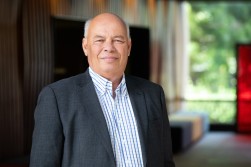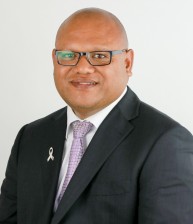
Effective Pacific leadership about serving others
Good leadership is about doing the right things at the right time and for the right reasons, says Public Health specialist and Associate Dean Pacific at the University of Auckland Faculty of Medical and Health Sciences, Sir Collin Tukuitonga.
and Associate Dean Pacific at the University of Auckland Faculty of Medical and Health Sciences, Sir Collin Tukuitonga.
Sir Collin, who has just been appointed as the World Health Organisation (WHO) chair of the Strategic and Technical Advisory Group on the Prevention and Control of Noncommunicable Diseases made the comment during his presentation at HPF’s Pacific Health Promotion on June 5.
The webishop was entitled ‘Tufunga Fonua Ola - How effective Pacific leadership ensures Pacific wellbeing in times of great challenges’.
Sir Collin was part of a panel, which included Dr Aumea Herman, Chief Clinical Advisor Pacific Health at Manatū Hauora New Zealand Ministry of Health and Tevita Funaki, CEO of the Fono.
They looked at how good governance and leadership can set and navigate strategic pathways that enable Pacific communities and others to walk a pathway to wellbeing and take greater control of their future.
Sir Collin shared examples of different types of leadership, his views on what effective leadership looked like, especially during times of challenge, and what leadership in the Pacific context looked like.
‘When there are challenges or difficulties that is when you need good, strong, ethical leadership. Values are important in leadership, to stand up, speak up and speak out when things are not going to plan.’
Servant leadership
In Pacific communities, said Sir Collin there was the notion of ‘servant leadership’.
‘You lead by serving, you don’t lead by power-tripping over other people. So, leadership is facilitating a journey for us all in a particular direction.’
He said effective leaders when faced with challenges stand up, speak up, rearticulate values that are important to us all particularly for Pasifika peoples and Māori, where we have communal and shared values.
‘You learn from the early days in the village on the rock that it’s not about yourself it’s about your community, it’s about us all.
Public health, he emphasised, was about the ‘greater good’, as well as about ‘social justice’.
‘Leadership that encourages and promotes social justice is in my view is what we should be striving for particularly when there are challenges aplenty!’
Dr Aumea: Learning from the past
 Dr Herman’s discussion centred on Pacific governance and leadership.
Dr Herman’s discussion centred on Pacific governance and leadership.
She said it was good to remind ourselves about where we’ve come from and focused on how we need to remember the past, to understand why and where we’ve landed and what we need to do to get better outcomes for our people.
The best advice she said was that drawn from other leaders, those who’ve gone before and those who’re emerging as leaders.
“Modern Pacific health also demands us to engage with our younger generation and understanding the drivers that make our work more effective.’
Dr Herman reminded us about the determinants of health, stressing that the commercial determinants were a worry because they really made life difficult for the public health and health promotion workforce.
She also warned that we cannot forget existential threats such as the climate crisis, NCDs and pandemics.
Leaders were facing big challenges ahead. ‘We’ve got big learnings, we’ve got many experts … who know the solutions around what we can do, but it’s really making sure we as a people, we as a collective can do something about it in the near future.’
Tevita: Guiding principles as a leader
Tevita said when he thought about ‘tufunga’ it was not just about building but carefully constructing things for  wellbeing, and it was about effectiveness
wellbeing, and it was about effectiveness
He shared some practical examples of lessons learned from the Covid pandemic and recent severe weather events in Aoearoa that demonstrated some of the required leadership skills.
Tevita said some of his guiding principles for navigating things as a leader were fundamentally based on the core values he had developed over the years that were closely linked to his cultural values, and the the way he was brought up in his homeland of Tonga, and in the church community.
He said he was also fortunate to work for an organisation which shared values around leading from the front, leading with the team, with integrity respect and caring for others.
He agreed that the pathway to good leadership was through ‘servant leadership’.
‘It is about thinking what is best for others and using the skills you have to be able to influence them – being able to adapt to different situations is really helpful and is underpinned by having the courage to be able to voice what is important for your communities, your families and the beneficiaries you are serving.’